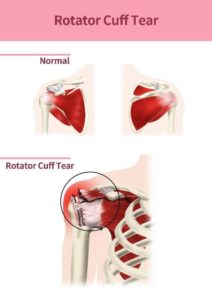Rotator Cuff Pain/Injury Treatment in Chillicothe, OH
The rotator cuff is a group of muscles and tendons that connect your shoulder blade to the bone of your upper arm (humerus). These muscles and tendons help you lift and move your arm and play an important role in your arm and shoulder function.

Types of Rotator Cuff Injuries
You can suffer from many different rotator cuff injuries. The following rotator cuff injuries are common:
- Rotator cuff tear
- Tendinitis
- Bursitis
Rotator Cuff Tear
 A rotator cuff tear occurs when the tendons pull away from the arm bone. A rotator cuff tear can occur as the result of an accident where the injury tears the rotator cuff. A rotator cuff can also tear as the result of repetitive use, and can become more vulnerable as one gets older. These degenerative types of tears can be caused by bone spurs, decreased blood flow and overuse from repetitive shoulder movements.
A rotator cuff tear occurs when the tendons pull away from the arm bone. A rotator cuff tear can occur as the result of an accident where the injury tears the rotator cuff. A rotator cuff can also tear as the result of repetitive use, and can become more vulnerable as one gets older. These degenerative types of tears can be caused by bone spurs, decreased blood flow and overuse from repetitive shoulder movements.
A rotator cuff tear may be either partial or complete. If a portion of the tendon is still attached to the bone, it is a partial tear. If the tendon is completely separated from the bone, it is a complete tear.
A rotator cuff tear can result in arm and shoulder weakness. You may find it difficult to raise your arm or hear popping/clicking sounds when moving your arm. It may also include constant pain or pain that gets worse with motion, especially if the tear is the result of an acute injury rather than a degenerative process.
Consultation and Exam
If you think you may have a torn rotator cuff, you should contact Dr. Cohen immediately. Dr. Cohen and/or one of his sports medicine colleagues will obtain a complete “history of present illness” from you and conduct a focused, comprehensive physical exam to evaluate your shoulder for areas of tenderness, assess range of motion and establish if you have normal or decreased arm strength. Depending on the findings, the doctor may order an X-ray and/or an MRI.
Treatment Options
You can take steps to improve the health of your torn rotator cuff, but a complete tear cannot heal on its own. Nonsurgical treatment of a torn rotator cuff can include an arm sling for rest, activity modification, nonsteroidal anti-inflammatory drugs, physical therapy and a steroid injection.
If nonsurgical treatments do not relieve the pain and return the shoulder to normal mobility, you may need surgery. One option may be minimally invasive surgery which uses an arthroscope and small incisions to complete the procedure. This type of surgery can enable a faster recovery than traditional approaches because it is associated with less surgical trauma and has less risk of complications, including post-operative stiffness and infection.
Rotator Cuff Tendinitis
If your shoulder joint tendons and muscles are inflamed, you may have rotator cuff tendonitis.
Symptoms
If you have rotator cuff tendinitis, you may suffer from arm and shoulder weakness. You may hear popping/clicking sounds when moving your arm. You may also have pain or swelling in your arm and/or shoulder. Your symptoms will most likely get worse over time with continued activity.
If you are having pain, weakness and loss of function in your shoulder that is unresponsive to rest, ice and over-the-counter anti-inflammatories, you may have rotator cuff tendinitis. When symptoms do not improve with the RICE protocol (Rest Ice Compression Elevation) you should contact Dr. Cohen’s office for an evaluation by him or one of his sports medicine colleagues.
Treatment Options
Nonsurgical treatment of rotator cuff tendinitis may include rest, nonsteroidal anti-inflammatory drugs, platelet-rich plasma injections, corticosteroid injections and physical therapy. More than 90 percent of the time, non-operative treatment is success for treating rotator cuff tendonitis; in the rare instance that it is not, a surgical procedure may be recommended. Surgery for isolated rotator cuff tendinitis is rarely required, but an extensive course of conservative management fails, the surgery is done arthroscopically with the goal to remove inflammation and irritating factors that promote inflammation.
Rotator Cuff Bursitis
Rotator cuff bursitis is the inflammation or irritation of your bursa, a small fluid-filled sac that protects your rotator cuff.
If you are having pain, weakness and loss of function in your shoulder that is unresponsive to rest, ice and over the counter anti-inflammatories, you may have rotator cuff bursitis. Contact Dr. Cohen’s office for an evaluation by him or one of his sports medicine colleagues.
Treatment Options
Nonsurgical treatment of rotator cuff bursitis may include rest, anti-inflammatory drugs, corticosteroid injections and physical therapy.
Surgery for isolated rotator cuff bursitis is rarely required, but if an extensive course of conservative management fails, the surgery is done arthroscopically, with the goal of removing inflammation and irritating factors that promote inflammation.
Why Choose Dr. Cohen?
OVER 20 YEARS EXPERIENCE
One of the first orthopedic surgeons employed by a large hospital. Dr. Cohen spent 20 years.
TRUSTED BY OVER 100,000+ PATIENTS WORLDWIDE
Over his distinguished career, Dr. Cohen has cultivated a reputation of excellence and trust among his patients and his peers.
UTILIZING THE LATEST TECHNOLOGY
To achieve the best surgical outcomes, Dr. Cohen utilizes the most advanced technologies and techniques, keeping his practice state of the art.
PATIENT SAFETY IS TOP PRIORITY
An individualized, patient-focused process coupled with decades of training and experience help ensure maximum safety for all of Dr. Cohen’s patients.
Schedule Your Rotator Cuff Consultation
If you think you have a rotator cuff injury, schedule a personal consultation with orthopedic surgeon Dr. Brian Cohen by calling or emailing his office today. Dr. Cohen has extensive rotator cuff surgical experience and can help you learn more about the surgical (and non-surgical) options for your rotator cuff injury.






